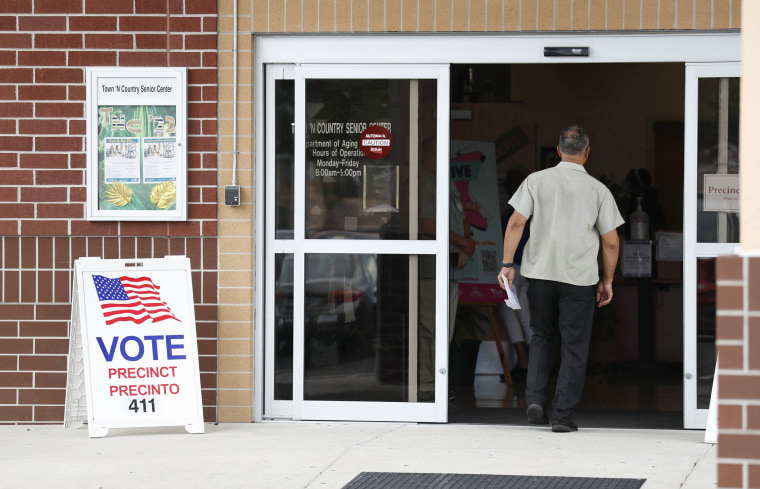Last month, Florida Gov. Ron DeSantis announced the first charges stemming from a newly formed election police unit he helped to create in the state. But in the weeks since then, complicating information has emerged that could make it harder for the state to obtain convictions, advocates and at least one prominent Republican official said.
Voting rights advocates are blaming what they describe as a confusing process that makes it difficult for either the suspects or election officials to tell whether they're eligible to vote.
All 20 individuals had been previously incarcerated on convictions of murder or felony sexual offenses — which prohibits them from voting in Florida — and had cast ballots illegally in the 2020 election, DeSantis said at the news conference in August announcing the charges. Under Florida law, while many felons can regain their right to vote under a constitutional amendment enacted via a ballot initiative in 2018, those convicted of the most violent offenses, such as murder and rape, cannot.
“This is just the opening salvo,” DeSantis, who is widely believed to be considering a run for president in 2024, said at the news conference. “Before we proposed this [new office] there were examples of this stuff seeming to fall through the cracks.”
Advocates claim those arrested did not know they were breaking the law — and that in many cases government officials had sent them voter registration materials. Many have now urged those arrested to fight the charges. They have also raised questions about whether the new police force is the best way to fix a broken system and decried the lack of a central database that could help officials avoid superfluous criminal charges.
“It’s clear that nobody notified them" that they were ineligible to vote. "They sent them voter registration cards, that’s the exact opposite of intent to break the law, they essentially cleared them,” said Republican state Sen. Jeff Brandes, the architect of a separate, 2019 law that made it more difficult for ex-felons to vote, in an interview.
“That makes it incredibly difficult to prove intent,” Brandes added. “The state’s attorneys are going to have a very difficult time proving they did this intentionally,” he said. Brandes predicted the charges would eventually be dropped.
Under Florida law, to convict individuals of voter fraud, the state must prove that they intentionally and knowingly registered to vote — or voted — despite knowing that they were ineligible to do so.
“I just don’t know how you prove intent to break the law for someone who thought they were eligible to vote because they received a state-sanctioned voter registration card,” said Neil Volz, the deputy director of the Florida Rights Restoration Coalition, which is helping many of those arrested to find attorneys and pay for bail.
Incidents of voter fraud are incredibly rare in the U.S., and past and present investigations by law enforcement agencies around the country have struggled to find more than a handful of cases amid the millions of ballots cast in America.
A new police force and a confusing system
DeSantis signed a bill in April that formally created a police force dedicated to hunting down voter fraud and other election crimes — a top priority for Republicans amid continuing false claims by former President Donald Trump that the 2020 election was stolen from him.
Then in August DeSantis announced the first arrests made by that force, revealing at a news conference that the Office of Election Crimes and Security would be charging 20 individuals who had been previously convicted of murder or felony sexually offenses. Florida’s 2018 amendment ended a permanent ban on voting for felons, except for those convicted of murder and felony sexual offenses. That restoration, however, also excluded convicted criminals who hadn’t completed “all terms” of their sentencing. In 2019, Florida lawmakers — led by Brandes — enacted a law that included within those terms the paying of all court fees and fines.

Brandes and Volz said that the years since had created a labyrinth of records regarding who is and is not eligible to vote in the state, which they said is a central factor in why many of the individuals arrested believed or simply didn’t know if their voting rights had been restored. They and other voting rights advocates point out that the state never created a central database that could be used to efficiently cross-check and determine which people who had gone through the criminal justice system could and could not vote.
Of the 18 individuals officials said had so far been arrested on the charges, many have said they received a voter registration card from a county election supervisor’s office and believed they were eligible to vote, while some said they’d returned registration cards merely to determine whether they were eligible to vote, according to court documents reviewed by NBC News and reporting by the Miami Herald and other outlets.
In a lengthy email, a spokesman for the Florida Department of State — of which the Office of Election Crimes and Security is a part — indicated that the obligation to determine whether a felon was eligible to vote fell on the individual.
The spokesman, Mark Ard, described a convoluted and often time-consuming process by which various state agencies check with one another in determining voter eligibility for felons and suggested that the individuals broke the law when they simply returned registration materials, even though the materials in many cases were sent to the individuals by election officials.
“Felons who had not had their rights restored submitted a voter registration application (which is in itself a felony) and subsequently voted,” Ard said.
Ard also said that county election supervisors — among the officials who sent such materials — had the authority to take action to remove a voter from the statewide voter registration system.
“Nothing prohibits a supervisor of elections from acting independently from the Department to gather this information,” he said.
“These individuals lied when they registered to vote. They were never eligible and there is no confusion on that point. We are confident that when all the facts and evidence are revealed through the legal process, the reasons these individuals were arrested will be clear,” Ard said. A spokesperson for DeSantis did not respond to questions from NBC News about the issue.
The director of the election crimes office, Peter Antonacci, however, sent a letter to county elections supervisors in the state saying they hadn’t done anything wrong, Politico reported this week. NBC News has not obtained the letter.
Brandes and Volz say the state is to blame, even though the materials were sent by local election officials.
“At the end of the day, the state is responsible for determining voter eligibility for people on the state’s voter rolls,” Volz said. He also said he’d be “surprised if the charges stick.”
Volz, whose group is working with many of the individuals charged, said that no one — either from a county election supervisor’s office or from the state — had notified any of the arrested individuals that they were ineligible to vote.
“There’s no evidence that occurred,” he said.
Moving forward, Volz and Brandes say the Florida Department of State should create well-maintained databases of Floridians convicted of murder or felony sexual offenses, as well as convicts who still owe money for court fees, and update the voter rolls accordingly.
“County election supervisors don’t have the resources or access to multiple databases that would allow them to make that kind of determination,” Brandes said.

